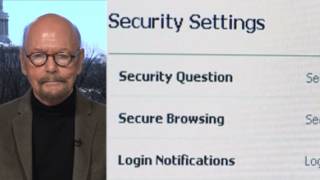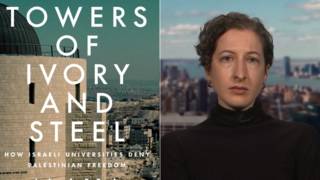
Related
Topics
Guests
- Rick Ayersfounder of the Communication Arts and Sciences program at Berkeley High School and adjunct professor in teacher education at the University of San Francisco. He is the co-author, with his brother William Ayers, of the forthcoming Teaching the Taboo.
Waiting for Superman, a new documentary by filmmaker Davis Guggenheim, has caused a stir in the education world for its sweeping endorsement of the charter school movement and attack on teachers unions. President Obama has endorsed the film, describing it as “heartbreaking” and “powerful,” but some teachers have called for a boycott of the film for its portrayal of teachers and the teachers union. We speak to Rick Ayers, founder of the Communication Arts and Sciences program at Berkeley High School and adjunct professor in teacher education at the University of San Francisco. [includes rush transcript]
Transcript
JUAN GONZALEZ: Four years ago, filmmaker Davis Guggenheim helped propel the issue of global warming into the national dialogue when he released the documentary An Inconvenient Truth, chronicling Al Gore’s crusade to address climate change. Guggenheim is now back with a new movie called Waiting for Superman about the state of the nation’s education system. The film opens nationwide in theaters tonight, but it has already caused a stir in the education world for its sweeping endorsement of the charter school movement and for its attacks on teachers unions. President Obama has endorsed the film, describing it as “heartbreaking” and “powerful,” but some teachers have called for a boycott of the film for its portrayal of teachers and the teachers unions.
Here is an excerpt from the trailer.
MICHELLE RHEE: You wake up every morning, and you know that kids are getting a really crappy education right now.
INTERVIEWER: So you think that most of the kids here are getting a crappy education right now.
MICHELLE RHEE: Oh, I don’t think they are. I know they are.
GEOFFREY CANADA: Either the kids are getting stupider every year, or something is wrong in the education system.
STUDENT: I just has to do my best at school and make my grandmother proud.
NARRATOR: Among thirty developed countries, we rank twenty-fifth in math and twenty-first in science. In almost every category, we’ve fallen behind, except one. Kids from the USA rank number one in confidence.
UNIDENTIFIED: I think about 60,000 people have gone to this school in four years. Forty thousand didn’t graduated. This the damage that this school has done to this neighborhood.
NARRATOR: A child that doesn’t finish high school will earn less and be eight times more likely to go to prison.
STUDENT: I want to go to school.
NARRATOR: For these kids, their only chance at getting into a great school depends on whether their number is picked in a lottery.
JUAN GONZALEZ: While the film opens tonight, it has been featured all week as part of NBC’s special Education Nation Summit.
I’m joined now from Berkeley by former high school teacher Rick Ayers, who outlines his critiques of the film in an article for the Huffington Post titled “Inconvenient Superman.” Rick Ayers is the founder of the Communication Arts and Science program at Berkeley High School and is currently adjunct professor in teacher education at the University of San Francisco. He’s the co-author, with his brother William Ayers, of the forthcoming Teaching the Taboo.
Welcome to Democracy Now!
RICK AYERS: Good morning.
JUAN GONZALEZ: Rick, could you lay out for us some of the critique that you have developed of Waiting for Superman?
RICK AYERS: Well, there’s a lot of dueling facts we could throw out, different things they got wrong. But I think that, as we think about it, there are fundamental differences philosophically in how we approach schooling and what should be done. I think that I was very hopeful that the movie was going to be an exciting call to arms for more focus on education. But it turned out — and actually I favor charters. Some charters are quite good. But the idea that charter schools are the panacea, and the kind of charter schools that it advocates, the kind of private school charter with a lot of outside money, is actually just kind of — undermines the whole possibility of us having a deeper conversation about how to make education available to all students.
I mean, one of the biggest dishonesties in the film is that it suggests that the Harlem Children’s Zone and the Success Academy school that they have is just wonderful and everyone would like to be in it. And, of course, it is wonderful, because they have private donations that amount to two-thirds of their budget, plus they have other money which is used for full medical care, counseling, all kinds of social services that other students don’t get. So, therefore, they’ve shown, in a certain way, how much it costs to actually be successful. So, of course, they’ve created this wonderful school. After saying that, the — Guggenheim says, “But money isn’t the answer. Money isn’t anything. It’s just bad teachers.” Well, somehow he sweeps aside the amount of money that has made this model school happen.
In a way, it reminds me of the Horatio Alger stories in the nineteenth century, when there was great union agitation for raising up the working class, and these Horatio Alger stories would be these wonderful individual stories of individuals who worked hard and did what they were told and became successful, so we do not need a union movement, we just need individuals to succeed under capitalism. And these stories about individuals making it out of the ghetto and the very moving examples of the scholarship student who gets out are put forward precisely to avoid any talk about real problems of poverty, real problems of access, real problems all the students are facing in a place like Harlem.
JUAN GONZALEZ: Yeah, I’ve been struck, Rick, by — during this week of this Education Nation Summit, by the enormous publicity apparatus that has been developed to promote both charter schools and the elimination of tenured schools and attacks on the teachers unions. You’ve got the Gates Foundation, the Broad Foundation in California. The Phoenix University — the University of Phoenix, the for-profit school, was one of the sponsors of the summit. And I reported in today’s Daily News
about this, even some of these lotteries that are featured in both the Waiting for Superman and in the earlier film, The Lottery, that came out earlier this year, showing thousands of parents anxiously awaiting their children getting — being admitted to a charter school that, in one case, Harlem Success Academy, the — one of the other schools in Harlem, spent more than a million dollars in the last two years just on their promotion, advertising and recruitment campaign to build up their applicants.
RICK AYERS: Right.
JUAN GONZALEZ: So there’s an enormous promotion campaign being funded by corporate America to put forth this viewpoint of expanding charter schools and eliminating safeguards for teachers.
RICK AYERS: Yes. Well, and, you know, there was a time, a rather naïve time, I think, when we all thought we were friends, and we were all interested in school reform and making it more effective and powerful, and both sort of big corporate money and school progressives worked together. But it turned out they had a much more sinister strategy and desire of what they wanted to accomplish, and that was really to privatize public school. And it’s people who are enamored of the market, market forces. The invisible hand of the market makes everything fabulous, as they’ve shown with the economy. And yes, the idea that all education is for job training, for a slot in the economy as the CEOs foresee it. Nothing in education in this vision has to do with students questioning their circumstances, imagining a different future, constructing a future that would be humane and a good place to live. None of that. It’s all train, train, train for a position, a slot in the economy as it is.
And so, they’ve put forward certain charters, and The Lottery is this very cruel public ritual where they put children in a room and have them cry if they don’t get in the good school, and they film them. I call that child abuse. But you also see, like in New Orleans, you know, the kind of disaster capitalism project was the schools were so destroyed that charters came in, full bore. And now, these charters — many of these charters, in fact, are not open admissions. They kick out students who they decide they don’t want. They keep out special ed students. They make them elite charters. So they’re creating a situation where there are educational opportunities for some, and others are just in kind of discipline, pre-prison type of conditions.
JUAN GONZALEZ: Well, we tried to get Davis Guggenheim or someone from — who was involved in making the film to come on Democracy Now! but were unable to do so. But Davis Guggenheim was on The Tavis Smiley Show this week, and he refuted the criticism of his film as being anti-union.
DAVIS GUGGENHEIM: You’re talking to two lefties.
TAVIS SMILEY: Yeah.
DAVIS GUGGENHEIM: OK? I’m assuming you’re a lefty. I’m a lefty. I’m a member of a great union, the Directors Guild of America.
TAVIS SMILEY: Mm-hmm.
DAVIS GUGGENHEIM: My family, that’s what we talked about at the dinner table. The moment when workers organized in America was a wonderful thing. And I believe the teachers union should be around for a very long time. They should pay their — they should make sure their workers get paid a lot of money, and they should protect them from abuse. But they should not get in the way of reform. They should not be fighting in politics, trying to keep charters down and keeping the school day shorter and protecting bad teachers. And that’s what we’re talking about.
JUAN GONZALEZ: That was filmmaker Davis Guggenheim, maker of Waiting for Superman. What about this issue that teachers unions are in the way of reform?
RICK AYERS: You know, it’s funny. He’s very cleverly constructed this narrative. And actually, when Randi Weingarten, the head of the AFT, which actually started the first charters as a way to break away from the deadening bureaucracy of many districts and have some innovative laboratories for stronger schooling — Randi Weingarden is pro-charter. She’s got a union project with charters. The AFT has started charters. But they needed a bad guy, and they put her on. And you watch even how the lighting is, the camera angles, and the Darth Vader music that comes in behind Randi Weingarten. So it’s really kind of odd that they’ve set her up as the opposition, and it was manipulative.
But the truth is that tenure is not a problem. There isn’t even really tenure. It’s not like a tenure for a university professor. There’s a requirement for due process to remove teachers. That’s because, before we had that, principals removed people for their race, sexual orientation, political ideas. That’s not a good idea, so there needs to be due process.
And the idea that the teachers union doesn’t want to get rid of bad teachers, that’s one of the most disgusting charges, and it’s actually one of the key charges that the movie makes, because the truth is that when they create union-sponsored review of teachers, called peer reviews, so you have a process where it’s union members who are checking each other out and observing, writing reports and getting teachers improvement plans or removing teachers. When there’s teacher peer review, many more teachers are removed from the classroom than when administrators do it. Administrators just don’t get around to it, don’t do the paperwork, don’t have the time or care. But teachers don’t want a bad teacher down the hall. So there is nothing in the teachers union that is standing against bad teachers. But bad teachers is this framing of the argument that — as if that’s the problem. Yes, there are always some bad teachers. And anyone who’s put their kids through school knows that they love most of the teachers they encounter, and there are some they think are like, “Dang! That’s not really a great teacher.” So, you know, that’s part of the deal, but — and we want to improve teaching.
But what they’re doing by demonizing teaching, saying money isn’t the problem, keeping the pay of teachers low — it’s often a women’s profession, so it’s a gendered type of framing of someone who shouldn’t get paid that much — is keeping people out of the profession. You know, we’re supposed to need 1.6 million teachers over the next couple of years, but a third of all teachers who start quit in their first few years, because they get driven out by frustration, by the lack of options. So, this film is contributing to keeping talented and interested people, who would love to dedicate themselves to education, keeping them out of the field.
JUAN GONZALEZ: Well, here’s a clip from the movie Waiting for Superman featuring Microsoft chairman and billionaire and philanthropist Bill Gates, who some — many people feel is having a bigger impact on public education than most public officials.
NARRATOR: At the end of 2009, the unemployment rate was almost ten percent, but the high-tech industry could not find enough qualified people to fill their jobs. Instead, they had to go halfway around the world to recruit the engineers and programmers they needed.
BILL GATES: The only really proven thing to make an economy work well is to have a well-educated workforce. And people get panicked about the economic success of this country. Well, there’s one thing that will determine that.
NARRATOR: Bill Gates was so worried about the state of our schools, he testified before Congress.
BILL GATES: We cannot sustain an economy based on innovation unless we have citizens well educated in math, science and engineering. If we fail at this, we won’t be able to compete in the global economy. How strong the country is twenty years from now and how equitable the country is twenty years from now will be largely driven by this issue.
JUAN GONZALEZ: Rick Ayers is a former high school teacher and founder of the Communication Arts and Science program at Berkeley High School. Your response to Gates’s analysis?
RICK AYERS: Oh, my! Bill Gates was so concerned, he testified before Congress. You and I are concerned. We’d like to testify. We’re not invited. So somehow, because he’s Bill Gates, it’s such a wonderful thing that he went and testified. I don’t really get all of this. We could be doing much stronger education in the sciences, but the idea that this man needs them for slots in his corporation and that’s how the world should be is — again, that’s what I’m saying. There is no invitation to question how the economy is done and what’s happening.
There’s also in there, if you noticed, which is very important to kind of read between the lines, there’s a notion that we’re at war. We’re at war with China and India, and it’s an economic competition, and the important thing is that we beat them, so that we will be on the top, they will continue to be in the sweatshops. We don’t want their economies to rise up. It’s this international struggle. It’s a Darwinian battle, and we must win. Well, I don’t remember when I signed up for that war. I don’t remember when a little six-year-old became a soldier in that war. And maybe students should be learning to imagine a world where we don’t have empire and we don’t have such inequities in the world economy and we get along better with people around the world. That’s nowhere in there.
JUAN GONZALEZ: Well, Rick Ayers —-
RICK AYERS: Everyone’s expecting -—
JUAN GONZALEZ: — we have about a minute left. I’d like to ask you one other question, which is about the issue of the role of parents and communities. In the '60s and ’70s, obviously, there was a huge move by minority parents to gain control of their public schools, to have more of a say in how their children were educated. And now we're getting an essentially top-down movement, determining how the schools and local communities will be determined, even who goes to them, and, in essence, breaking down the sense of a community school.
RICK AYERS: Yes, that’s a wonderful point. I think that — look, at the essence of it, we need to decriminalize learning. Learning today is so surveilled and tested and “gotcha” questions. And students are being told from the top what’s right and wrong. And we need to make learning again a —-
JUAN GONZALEZ: We’ve got about ten seconds.
RICK AYERS: —- curriculum of understanding. And we need to get back to transforming the power in communities.
JUAN GONZALEZ: Alright, well, Rick Ayers, I want to thank you, a former high school teacher, founder of the Communication Arts and Science program at Berkeley High School, is currently an adjunct professor in teacher education at the University of San Francisco.












Media Options